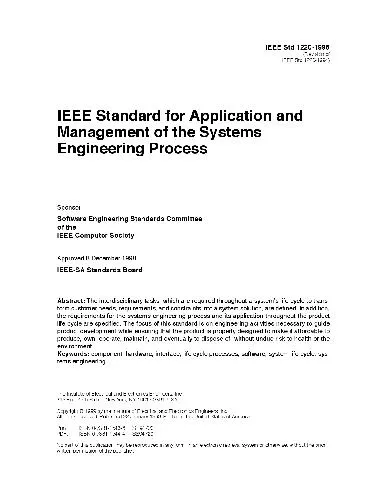Dissipative Systems Analysis and Control: Theory and Applications (Communications and Control Engineering)
4.3
بر اساس نظر کاربران

شما میتونید سوالاتتون در باره کتاب رو از هوش مصنوعیش بعد از ورود بپرسید
هر دانلود یا پرسش از هوش مصنوعی 2 امتیاز لازم دارد، برای بدست آوردن امتیاز رایگان، به صفحه ی راهنمای امتیازات سر بزنید و یک سری کار ارزشمند انجام بدینکتاب های مرتبط:
معرفی کتاب
کتاب Dissipative Systems Analysis and Control: Theory and Applications (Communications and Control Engineering) یک منبع جامع در زمینه سیستمهای منحرفشونده و کنترل آنها است. این کتاب با تدریس اصول، تحلیل و کاربرد این سیستمها، به پژوهشگران و دانشجویان مهندسی کنترل و اتوماسیون کمک میکند تا به جایگاههای علمی و کاربردی مهارتها و دانش خود دست یابند.
خلاصهای از کتاب
کتاب توسط نویسندگان، برنارد بروگلیاتو، روگیلیو لوزانو، برنارد ماشکه و اولاو اگلند نوشته شده است و به بررسی دقیق تئوریها و کاربردهای سیستمهای منحرفشونده میپردازد. این کتاب با تأکید بر مفهوم Dissipativity، که توانایی یک سیستم در جذب انرژی از محیط اطراف آن و اتلاف انرژی است، به تحلیل پایداری و رفتارهای دینامیکی سیستمها میپردازد.
یکی از ویژگیهای برجسته این کتاب ارائه ارتباط میان نظریههای سیستمهای منحرفشونده و کاربردهای عملی در زمینههای گوناگون نظیر مهندسی هوافضا، رباتیک، و سیستمهای انرژی است. همچنین، موضوعاتی همچون Hamiltonian systems،Passivity، و معیارهای پایداری متقارن نیز به طور گسترده بررسی میشوند.
نکات کلیدی
- توضیح جامع و شفاف مفهوم Dissipativity و تحلیل آن در سیستمهای کنترل.
- ارتباط میان تئوری کنترل کلاسیک و مدرن با تمرکز بر کاربردهای عملی و نوآورانه.
- شامل مثالها و مطالعات موردی که به وضوح نشاندهنده کاربرد تئوریها در مهندسی است.
- ارائه چارچوبهای ریاضیاتی سازگار با تحلیل سیستمهای پیچیده.
جملات معروف از کتاب
“In a world driven by innovation, understanding the dissipative properties of systems is key to ensuring sustainable and robust control mechanisms.”
“Harnessing the natural dissipativity of systems can lead to more efficient and effective control strategies.”
چرا این کتاب اهمیت دارد
این کتاب با بررسی سیستمهای منحرفشونده و روشهای کنترل آنها، به روشنسازی یک زمینه از دانش که پیش از این مبهم بود، کمک میکند. با ارائه روشهای تحلیلی و کاربردی نوین، این کتاب به مهندسان و پژوهشگران امکان میدهد تا درک عمیقی از چگونگی تعامل سیستمها و محیط داشته باشند. این مسئله نه تنها از نظر تئوری بلکه در اجرای عملی راهحلهای پایدار برای صنایعی نظیر خودرو، انرژی و رباتیک نیز اهمیت زیادی دارد.
Introduction to "Dissipative Systems Analysis and Control: Theory and Applications"
In a world driven by dynamic systems and inevitable uncertainties, understanding the fundamental principles of system control and analysis is paramount. "Dissipative Systems Analysis and Control: Theory and Applications" serves as a crucial resource for scholars, students, and professionals who seek to delve into the intricacies of dissipative systems and their control applications. This book, a part of the Communications and Control Engineering series, lays down a structured approach to analyzing and regulating dissipative systems, which are an essential class of systems frequently encountered in various engineering domains.
Detailed Summary
The book begins by introducing the core concepts of dissipative systems, offering a comprehensive theoretical foundation. It covers the history and development of dissipative systems from their inception to modern-day applications. The discussion extends to the classical theory of dissipative systems, highlighted by the systematic presentation of energy-based methods that aid in understanding system behavior.
Further, the book delves into feedback control strategies pertinent to dissipative systems. It includes a detailed exploration of passivity-based control, which is a subset of dissipative systems theory. The authors incorporate nonlinear control methods that emphasize robustness and adaptability, making the book relevant to real-world applications where linear assumptions fall short.
One of the critical strengths of this book is its application orientation. It provides numerous real-world examples and exercises across various fields, such as mechanical, electrical, and aerospace engineering. These examples demonstrate the efficacy of the theorized methods and provide readers with a practical understanding of the application of these strategies.
Key Takeaways
- Understanding the framework of dissipative systems and their characterization.
- Insights into energy-based methodologies for system analysis.
- Application of passivity and feedback control in nonlinear systems.
- Real-life engineering applications illustrated with comprehensive case studies.
- Enhancement of problem-solving skills through exercises at the end of each chapter.
Famous Quotes from the Book
"Understanding dissipative systems is not just about solving equations; it's about deciphering the language of energy flow and stability."
"The elegance of control engineering lies in its balance between theoretical elegance and practical applicability."
Why This Book Matters
This book holds significant relevance for anyone involved in systems engineering and control. Dissipative systems form the backbone of many technological advancements, and understanding their dynamics is crucial for innovation. The authors, each mastering different facets of control theory, bring a holistic perspective to the reader, merging classical knowledge with contemporary advancements.
By reading this book, one gains not only a theoretical understanding but also the ability to apply this knowledge effectively, hence bridging the gap between academia and industry. It's an indispensable guide for those seeking to advance in control engineering, equipping them with the necessary tools to tackle modern engineering challenges.
دانلود رایگان مستقیم
برای دانلود رایگان این کتاب و هزاران کتاب دیگه همین حالا عضو بشین
برای خواندن این کتاب باید نرم افزار PDF Reader را دانلود کنید Foxit Reader



